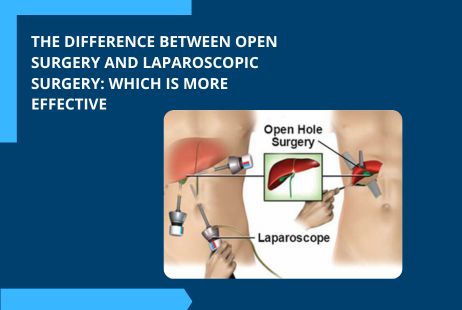
Two distinct approaches that stand out regarding surgical procedures are open surgery and laparoscopic surgery.
Both techniques have their unique characteristics, advantages, and outcomes. Understanding these surgical methods’ differences is crucial for medical professionals and patients seeking the most effective treatment for their specific needs.
In this article, we’ll explore the fundamental differences between these approaches, making it easier to understand which one may be more effective for you.
Difference Between Open Surgery and Laparoscopic Surgery
Open surgery and laparoscopic surgery are two different approaches to performing surgical procedures. Here’s a comparison of the two:
Incision Size
Open surgery, also known as traditional surgery, is a surgical approach where a single large incision is made in the skin to access the surgical site and perform the procedure.
On the other hand, in laparoscopic surgery, also known as minimally invasive surgery, several small incisions are made in the skin. Specialized instruments are used to perform procedures inside the body.
Visualization
In open surgery, the surgeon has a direct and unobstructed view of the surgical site since the incision is larger and allows for direct visualization of the organs.
In laparoscopic surgery, the surgeon views the surgical area on a video monitor through the laparoscope, providing a magnified and detailed view. The camera allows the surgeon to navigate and operate inside the body using the instruments inserted through the small incisions.
Pain
Laparoscopic surgery is associated with less pain compared to traditional open surgery.
This means that patients are less reliant on pain medications. Less pain also contributes to improved post-operative comfort, shorter hospital stays, faster recovery, and an overall positive patient experience.
Scarring
The smaller incision created in laparoscopic surgery means patients have fewer scars than in open surgery.
The advantage of less scarring in laparoscopic surgery is a significant consideration for patients concerned about the aesthetic outcome of their surgical procedure, especially for those undergoing procedures in visible areas of the body.
Risk of Complications
Open surgery carries a higher risk of infection, bleeding, and other complications than laparoscopic surgery due to the larger incision and more extensive exposure of organs.
However, there are still some risks in this minimally invasive surgery, including injury to organs, bleeding, or infection related to the smaller incisions and surgical instruments used.
Recovery Time
An individual requires more time to recover after open surgery when compared to a laparoscopy surgery.
Laparoscopic surgery generally causes less blood loss and tissue trauma and provides a faster recovery with reduced hospitalization compared to open surgery.
Additionally, patients who opt for laparoscopic surgery can expect a quicker return to normal activities, much faster than those who have had open surgery.
Suitability
Some complex or large-scale procedures may still require open surgery for optimal results.
Laparoscopic techniques are well-suited for various procedures, including gallbladder removal, appendectomy, hernia repair, and bariatric surgeries & many more in other surgical branches. But they have certain limitations for people with medical conditions like heart disease, etc.
It’s important to note that the choice between open and laparoscopic surgery depends on various factors, such as the specific medical condition, the patient’s health status, and the surgeon’s expertise. Your doctor will help determine the most appropriate approach for your case.
Which is More Effective— Open Surgery or Laparoscopic Surgery?
With increased public awareness and advances in minimal-access surgery, people ask whether they should go for open or laparoscopic surgery.
The effectiveness of open and laparoscopic surgery depends on various factors, including the patient’s medical condition and the surgeon’s expertise.
In many cases, laparoscopy surgery might not be feasible, and open surgery could have a better outcome. However, sometimes, it can be the opposite, and the conditions can be effectively treated using minimally invasive techniques.
Ultimately, the surgical team will decide which surgical approach to use after a thorough evaluation of the patient’s medical condition and individual circumstances. The goal is always to provide the safest and most effective treatment option for the patient’s specific needs.
How effective is laparoscopic surgery?
Laparoscopic surgery can be highly effective for various procedures across different medical specialties. The surgery offers benefits such as reduced pain, quicker recovery, smaller scars and lower infection risk.
The effectiveness of laparoscopic surgery depends on the surgeon’s experience and skill. Dr. Girish Juneja is a time-tested surgeon having more than 30 yrs experience in Dubai in laparoscopic bariatric & General surgery.
He strives to provide the highest quality Laparoscopic treatment for various medical conditions at reasonable costs. His dedication to patient care and advancements in the field ensures you receive the best possible care for your condition.
Contact us to schedule an appointment now.
